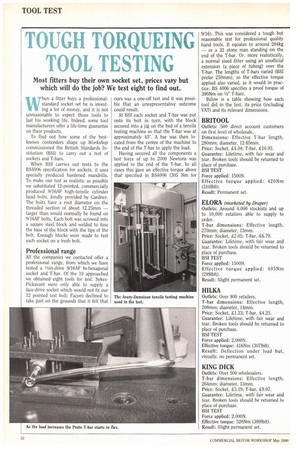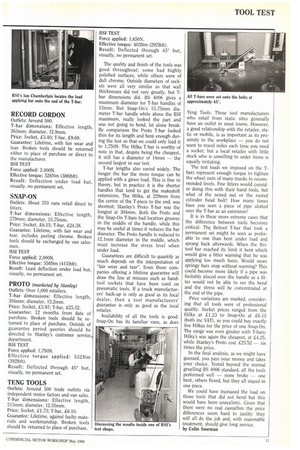TOUGH 1 ORQUEING TOOL TESTING
Page 142

Page 143

If you've noticed an error in this article please click here to report it so we can fix it.
Most fitters buy their own socket set, prices vary but which will do the job? We test eight to find out.
When a fitter buys a professionalstandard socket set he is investing a lot of money, and it is not unreasonable to expect those tools to last his working life. Indeed, some tool manufacturers offer a life-time guarantee on their products.
To find out how some of the bestknown contenders shape up Workshop commissioned the British Standards Institution (BSI) to carry out a test of sockets and 1-bars.
When BSI carries out tests to the BS4006 specification for sockets, it uses specially produced hardened mandrills. To make our test as realistic as possible we substituted 12-pointed, commercially produced 9/16AF high-tensile cylinder head bolts, kindly provided by Gardner. The bolts have a root diameter on the threaded section of about 12.25rnm — larger than would normally be found on 9/16AF bolts. Each bolt was screwed into a square steel block and welded to fuse the base of the block with the tips of the bolt. Enough blocks were made to test each socket on a fresh bolt.
Professional range
All the companies we contacted offer a professional range, from which we have tested a 1/2 in-drive 9/16AF bi-hexagonal socket and T-bar. Of the 10 approached we obtained eight tools for test: SykesPickavant were only able to supply a face-drive socket which would not fit our 12 pointed test bolt; Facom declined to take part on the grounds that it felt that ours was a one-off test and it was possible that an unrepresentative outcome could result.
At BSI each socket and 1-bar was put onto its bolt in turn, with the block secured into a jig on the bed of a tensile testing machine so that the 1-bar was at approximately 45°. A bar was then located from the centre of the machine to the end of the 1-bar to apply the load.
Having secured all the components a test force of up to 2000 Newtons was applied to the end of the T-bar. In all cases this gave an effective torque above that specified in BS4006 (305 Nm for 9/16). This was considered a tough but reasonable test for professional quality hand tools. It equates to around 204kg — or a 32 stone man standing on the end of the 1-bar. Or, more realistically, a normal sized fitter using an unofficial extension (a piece of tubing) over the T-bar. The lengths of T-bars varied (BSI prefer 250mm), so the effective torque applied also varied, as it would in practice. BS 4006 specifies a proof torque of 390Nrn on W 1-bars.
Below is a table showing how each tool did in the test, its price (including VAT) and its relevant dimensions.
BRITOOL
Outlets: 500 direct account customers on first level of wholesale.
Dimensions: Effective 1-bar length, 280mm; diameter, 12.65mm.
Price: Socket, £4.04; 1-bar, £10.93. Guarantee: Lifetime, with fair wear and tear. Broken tools should be returned to place of purchase.
BSI TEST Force applied: 1500N.
Effective torque applied: 420Nm (31011A).
Result: Permanent set.
ELORA (marketed by Draper)
Outlets: Around 4,000 stockists and up to 10,000 retailers able to supply to order.
T-bar dimensions: Effective length, 270mm; diameter, 13mm.
Price: Socket, £2.05; T-bar, £6.79. Guarantee: Lifetime, with fair wear and tear. Broken tools should be returned to place of purchase.
BSI TEST
Force applied: 1500N.
Effective torque applied: 405Nm (2991bft).
Result: Slight permanent set.
HILKA
Outlets: Over 800 retailers.
T-bar dimensions: Effective length, 208mm; diameter, 14mm.
Price: Socket, £1.23; T-bar, 14.25. Guarantee: Lifetime, with fair wear and tear. Broken tools should be returned to place of purchase.
BSI TEST Force applied: 2,000N.
Effective torque: 416Nm (3071bft). Result: Deflection under load but, visually, no permanent set.
KING DICK
Outlets: Over 500 wholesalers.
1-bar dimensions: Effective length, 264mm; diameter, I3mm.
Price: Socket, £3.19; 1-bar, £9.07. Guarantee: Lifetime, with fair wear and tear. Broken tools should be returned to place of purchase.
BSI TEST Force applied: 2,000N.
Effective torque: 528Nm (3891bft). Result: Slight permanent set.
RECORD GORDON
Outlets: Around 500.
T-bar dimensions: Effective length, 263mm; diameter, 12.9mm.
Price: Socket, £3.40; T-bar, 19.69. Guarantee: Lifetime, with fair wear and tear. Broken tools should be returned either to place of purchase or direct to the manufacturer.
BSI TEST Force applied: 2,000N.
Effective torque: 526Nm (3881bft). Result: Deflection under load but, visually, no permanent set.
SNAP-ON
Outlets: About 370 vans retail direct to fitters.
1-bar dimensions: Effective length, 279mm; diameter, 15.75mm.
Price: Socket, £6.15; 1-bar, £24.38. Guarantee: Lifetime, with fair wear and tear, includes peeling chrome. Broken tools should be exchanged by van salesmen.
BSI TEST Force applied: 2,000N.
Effective torque: 558Nm (411tbft). Result: Least deflection under load but, visually, no permanent set.
PROTO (marketed by Stanley) Outlets: Over 1,000 retailers.
1-bar dimensions: Effective length, 304mm; diameter, 13.2mm.
Price: Socket, £3.97; 1-bar, £25.52. Guarantee: 12 months from date of purchase. Broken tools should be returned to place of purchase. Outside of guarantee period queries should be directed to Stanley's customer service. department.
BSI TEST Force applied: 1,750N.
Effective torque applied: 532Nm 13921bft).
Result: Deflected through 45° but, visually, no permanent set.
TENG TOOLS
Outlets: Around 500 trade outlets via independent motor factors and van sales. 1-bar dimensions: Effective length, 215mm; diameter, 12.55mm.
Price: Socket, £1.73; T-bar, £6.10. Guarantee: Lifetime, against faulty materials and workmanship. Broken tools should be returned to place of purchase. BSI TEST Force applied: 1,650N.
Effective torque: 403Nm (2971b(t). Result: Deflected through 45° but, visually, no permanent set.
The quality and finish of the tools was good throughout; some had highly polished surfaces, while others were of dull chrome. Outside diameters of sockets were all very similar so that wall thicknesses did not vary greatly, but Thar dimensions did. BS 4006 gives a maximum diameter for 1-bar handles of 13mm. But Snap-On's 15.75mm diameter T-bar handle while above the BSI maximum, really looked the part and was not going to bend, let alone break. By comparison the Proto 1-bar looked thin for its length and bent enough during the test so that we could only load it to 1,750N. The Hilka T-bar is worthy of note in that, despite being the cheapest, it still has a diameter of 14mm — the second largest in our test.
T-bar lengths also varied widely. The longer the bar the more torque can be applied with a given load. This is fine in theory, but in practice it is the shorter handles that tend to get the makeshift extensions. The Hilka, at 229mm from the centre of the 1-piece to the end, was shortest; Stanley's Proto T-bar was the longest at 304mm. Both the Proto and the Snap-On 1-bars had location grooves in the middle of the handle, while this may be useful at times it reduces the bar diameter. The Proto handle is reduced to 12.1mm diameter in the middle, which must increase the stress level when under load.
Guarantees are difficult to quantify as much depends on the interpretation of "fair wear and tear". Even those companies offering a lifetime guarantee will draw the line at misuses such as handtool sockets that have been used on pneumatic tools. If a truck manufacturers' back-up is only as good as its local dealer, then a tool manufacturers' guarantee is only as good as the local retailer.
Availability of all the tools is good: Snap-On has its familiar vans, as does Teng Tools. Those tool manufacturers who retail from static sites generally have an outlet in most towns. However, a good relationship with the retailer, static or mobile, is as important as its proximity to the workplace — you do not want to travel miles each time you need a socket; but a local retailer with little stock who is unwilling to order items is equally irritating.
The test loads we imposed on the Tbars represent enough torque to tighten the wheel nuts of many trucks to recommended levels. Few fitters would consider doing this with their hand tools, but what of the seized nut or the rusted cylinder head bolt? How many times have you seen a piece of pipe slotted over the T-bar as an extension?
It is in these more extreme cases that the difference between tools becomes critical. The Britool 1-bar that took a permanent set might be seen as preferable to one than bent under load and sprang back afterwards. When the Britool bar reached its limit it bent which would give a fitter warning that he was applying too much force. Would more springy bars snap without warning? This could become more likely if a pipe was foolishly placed over the handle as a fitter would not be able to see the bend and the stress will be concentrated at the end of the pipe.
Price variations are marked, considering that all tools were of professional quality. Socket prices ranged from the Hilka at £1.23 to Snap-On at £6.15 (both inc VAT), Sc) you could buy exactly five Hilkas for the price of one Snap-On. The range was even greater with 1-bars: Hilka's was again the cheapest, at 14.25, while Stanley's Proto cost 12552 — six times the price.
In the final analysis, as we might have guessed, you pays your money and takes your choice. Tested beyond the normal gruelling BS 4006 standard, all the tools performed well — none broke — one bent, others flexed, but they all stayed in one piece.
We could have increased the load on those tools that did not bend but this would have been unrealistic. Given that there were no real casualties the price differences seem hard to justify: they will all do the job and, with reasonable treatment, should give long service.
by Colin Sowrnan








































































































































































